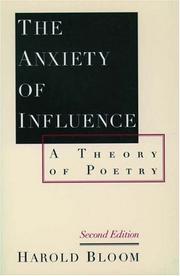Monday, March 7, 2011
The Influence of Anxiety
I think I have spoken here briefly about Harold Bloom’s The Anxiety of Influence: A Theory of Poetry, which speculates that it is “the struggle of the artist to find his or her own voice through an ambivalent, anxiety-ridden relation precisely with those precursors whom they most admire.”
But I’d also like to explore what it means to be writer who may be outside of the mainstream as a woman and/or as an ethnic person and the anxiety that that may produce in a writer.
This may perhaps be called the influence of anxiety on such a writer who does not see his or her experiences mirrored in the literature that they read. Now, I definitely don’t belong in the “banish the dead white male” camp (does anyone still work this tired politically correct notion?). Some of my favourite writers are DWMs: Tolstoy, Flaubert, Chekhov, Henry James, and in the category of a little less dead: Fitzgerald and Hemingway…not to mention the DWFs; Woolf, Wharton, Plath,.
It is sometimes unsettling how much they move me as a female reader. Tolstoy’s Anna Karenina, any of Chekhov’s heroines, James’ Isabel Archer or Kate Croy, Flaubert’s Emma Bovary, are to me, utterly convincing, moving, emotional, living beings. I don’t question the authenticity of the characters or the right of the male authors to create them.
The problem for me lies in the dreams of the aspiring writer – oh let’s say a working class kid from Hamilton who was not exposed to the habits of reading or writing and whose career aspirations were being pushed towards bank telling as an excellent career for girls (truly!) by her family. It is on the receiving end of the aspiring writer that the trouble here lies.
The anxiety mounts, it percolates, it simmers, reaching a crescendo: How I do that? How do I become a writer? Do I have the right to even try? Imagine how preposterous it might be to say to one’s father or mother who may work in factory or in street maintenance for the city or as a seamstress: I want to be a writer.
Is that idea welcome? Is it seen as feasible? Does the person who blurts out that ambition seem rational from their perspective? Not so much. It seems utterly ridiculous. What could you have to say? They are genuinely bewildered by the notion.
Because it’s not just about innate talent and hard work; it’s about opportunity, confidence, networking, marketing oneself.
And so it helps a great deal to see the success and talent of a Nino Ricci or novelist and academic Caterina Edwards or the poet Mary Di Michele to aspire to, to admire. Their success, their visibility, seems to say: yes. Simply yes.
Originally published in an altered format at descant.ca/blog.
But I’d also like to explore what it means to be writer who may be outside of the mainstream as a woman and/or as an ethnic person and the anxiety that that may produce in a writer.
This may perhaps be called the influence of anxiety on such a writer who does not see his or her experiences mirrored in the literature that they read. Now, I definitely don’t belong in the “banish the dead white male” camp (does anyone still work this tired politically correct notion?). Some of my favourite writers are DWMs: Tolstoy, Flaubert, Chekhov, Henry James, and in the category of a little less dead: Fitzgerald and Hemingway…not to mention the DWFs; Woolf, Wharton, Plath,.
It is sometimes unsettling how much they move me as a female reader. Tolstoy’s Anna Karenina, any of Chekhov’s heroines, James’ Isabel Archer or Kate Croy, Flaubert’s Emma Bovary, are to me, utterly convincing, moving, emotional, living beings. I don’t question the authenticity of the characters or the right of the male authors to create them.
The problem for me lies in the dreams of the aspiring writer – oh let’s say a working class kid from Hamilton who was not exposed to the habits of reading or writing and whose career aspirations were being pushed towards bank telling as an excellent career for girls (truly!) by her family. It is on the receiving end of the aspiring writer that the trouble here lies.
The anxiety mounts, it percolates, it simmers, reaching a crescendo: How I do that? How do I become a writer? Do I have the right to even try? Imagine how preposterous it might be to say to one’s father or mother who may work in factory or in street maintenance for the city or as a seamstress: I want to be a writer.
Is that idea welcome? Is it seen as feasible? Does the person who blurts out that ambition seem rational from their perspective? Not so much. It seems utterly ridiculous. What could you have to say? They are genuinely bewildered by the notion.
Because it’s not just about innate talent and hard work; it’s about opportunity, confidence, networking, marketing oneself.
And so it helps a great deal to see the success and talent of a Nino Ricci or novelist and academic Caterina Edwards or the poet Mary Di Michele to aspire to, to admire. Their success, their visibility, seems to say: yes. Simply yes.
Originally published in an altered format at descant.ca/blog.
Subscribe to:
Post Comments (Atom)










3 comments:
great article written .
My family suggested "teacher" as opposed to the bank since I had no gift for numbers. Studying journalism instead of English (which could lead to a good job as a teacher I was advise)was some cause for concern.
I think the most demoralizing aspect of coming from a working class background is the low expectations - and to even imagine that you could do something in the arts would be mistifying beyond belief!
Post a Comment